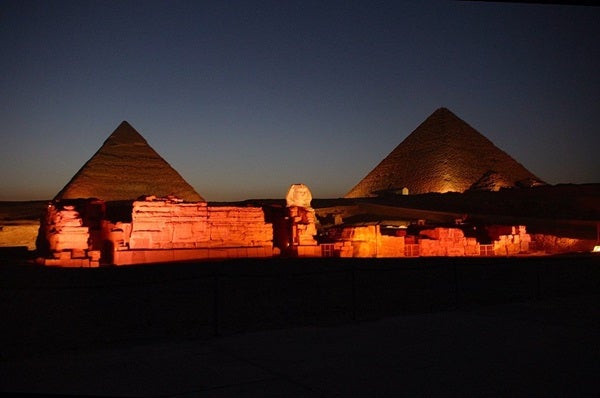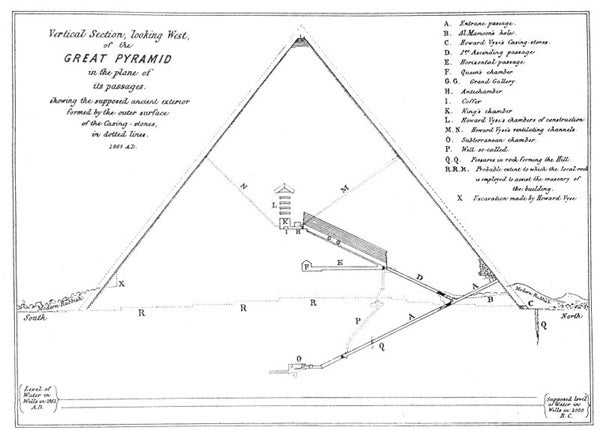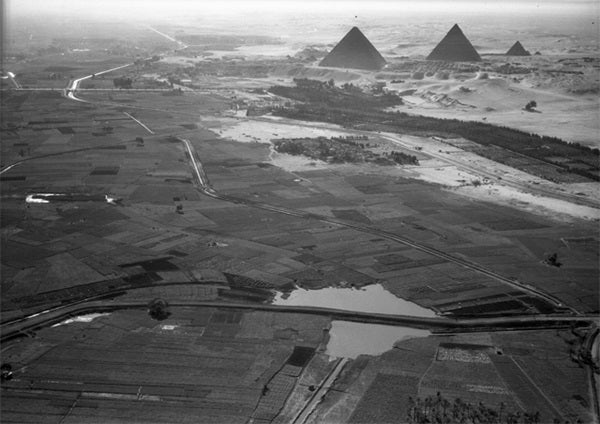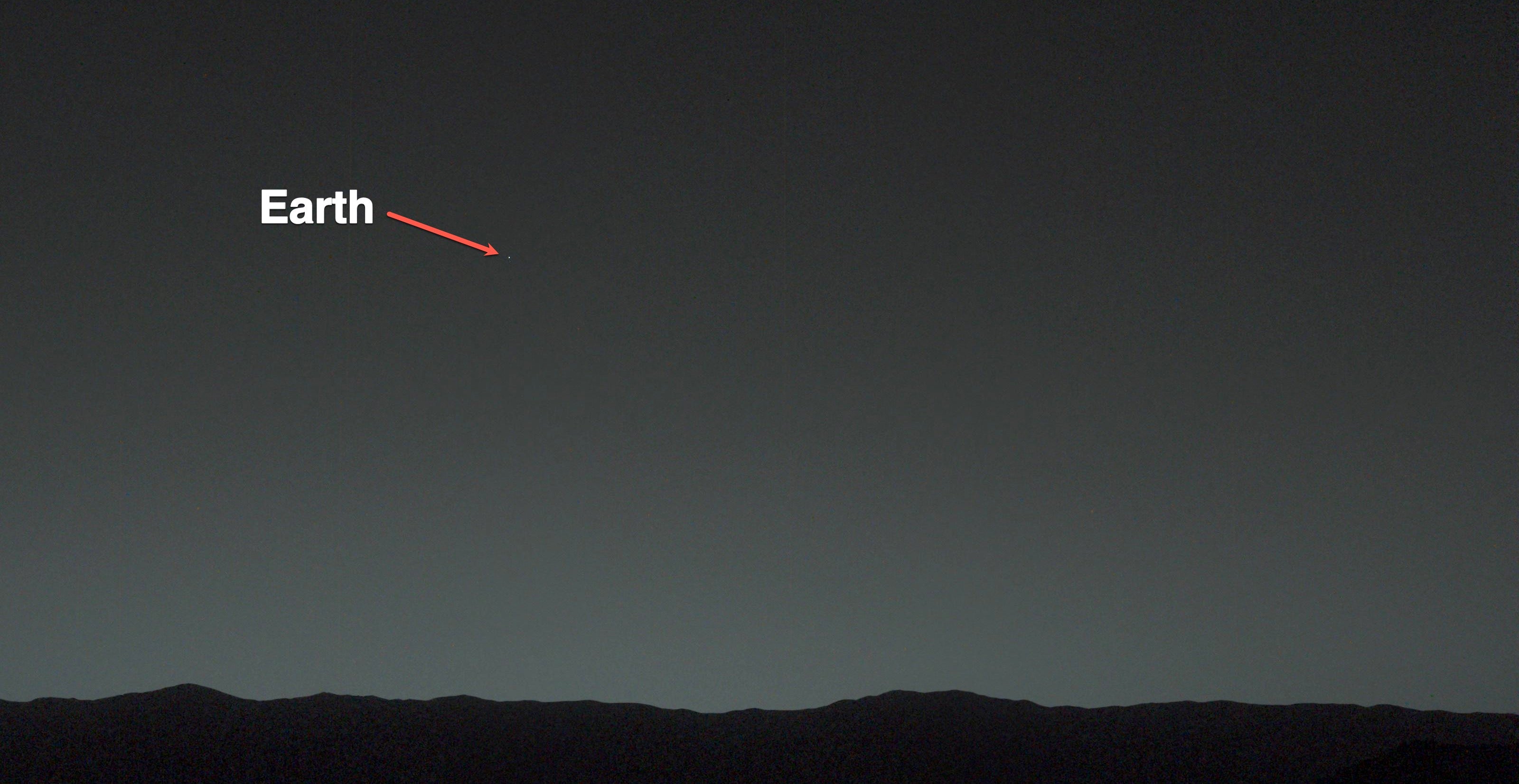Do the Egyptian pyramids line up with the stars?
This idea gets tossed around so often that many ancient Egypt fans simply accept it as true. And on the surface, it seems plausible. The ancient Egyptians tracked the night sky closely. They studied the constellations and used the motion of the stars to make decisions about when to plant crops and when to harvest. But there’s been a long debate over whether the pyramids themselves are actually aligned with any particular set of stars.
Over the decades, researchers have proposed a handful of possible celestial alignments for the pyramids, especially with the Giza Pyramid Complex. This famous site outside Cairo includes the Great Sphinx and three main pyramids: the Pyramid of Menkaure, the Pyramid of Khafre, and the Great Pyramid of Giza.
But the pyramids were built in the decades around 2500 B.C., during a period called the Old Kingdom of Ancient Egypt. So, any celestial alignment they have with the night sky would have to match what the heavens looked like some 4,500 years ago.
Egyptian pyramids: A gateway to the stars?
Theories about the pyramids’ connection to the stars go back a long way. But in the 1980s, a researcher named Robert Bauval came up with a suggestion that has since buried itself in the minds of the public. He pointed out that there are similarities between the layout of the three pyramids of the Giza Complex and the relative separation between the three stars of Orion’s Belt in the constellation Orion.
The idea went mainstream in Bauval’s 1995 New York Times bestseller, The Orion Mystery, which expanded on the notion that “the pyramids were created to serve as a gateway to the stars.” Bauval claimed that the constellation Orion governed the construction of all the pyramids. His idea came to be known as the “Orion correlation theory.”
Today, it’s considered a fringe idea in archaeology. Why? There’s no physical evidence to prove an intentional correlation. Plus, there’s nothing in Egpytian texts indicating the pyramids were intentionally designed that way.
Critics instead say that believers are succumbing to pareidolia — the human tendency to see shapes, patterns, and meaning in objects, even when no pattern exists. For example, seeing the face of the famous Man in the Moon.
The three pyramids weren’t all planned at once, either. The Pyramid of Menkaure, which is much smaller and sits a little farther away, seems to have been an afterthought, according to leading researchers. So, it’s a reasonable to think the distances between the monuments had no connection to the spacing between of the three stars of Orion’s Belt. Or, at least, no intentional connection to the stars.
Besides the lack of proof, the Orion Correlation Theory typically draws rolled eyes because it’s often packaged with other unusual claims. The people who defend the idea most passionately are usually the ones also championing tales of ancient aliens and forgotten technologically advanced cultures.
Pyramid ‘star shafts’
The Orion Correlation Theory grew from researchers’ interpretations of two mysterious, narrow shafts discovered in the Great Pyramid of Giza. These shafts extend from the so-called “King’s Chamber” into the pyramid’s walls. Some experts have suggested they are air shafts. But it’s unclear why the dead would need access to oxygen. Other researchers, however, think these tunnels served as pathways to heaven.
And in the 1960s, a group of Egyptologists suggested that these were actually star shafts, built to point toward important stars and constellations. Two researchers, Virginia Trimble and Alexander Badawy, found that one of the shafts seems to aim in the general direction of where the north star would’ve been when the pyramids were constructed. The other shaft, generally, points toward Orion’s Belt. These two sections of the sky were also known to be important in ancient Egyptian mythology.
The pole stars, including the north star, were known as “imperishable stars,” or “the indestructibles.” The Egyptians tied these unflinching stars with their beliefs about the afterlife, and thought their deceased pharaohs would join them there. “I [the king] will cross to that side on which are the Imperishable Stars, that I may be among them,” one passage reads. Similarly, Orion was also important to ancient Egyptian culture because its stars represented Sah, the father of the Egyptian gods.
The shafts likely wouldn’t have been useful for actually observing these objects, though. They were roughly oriented, with horizontal sections and large stones blocking their exit. But despite a number of attempted shaft explorations, the mystery of their true purpose has persisted for more than half a century.
Recent exploration of the pyramids
In 2020, researchers from Leeds University in the United Kingdom announced they had developed a small robot in an attempt to settle the shafts’ purpose once and for all. The robot successfully navigated through all 200 feet (60 meters) of one shaft, collecting nine hours of video footage along the way.
But a surprise was waiting for them at the end of the tiny tunnel. The robot was able to get a camera past the intentionally placed stone blocking the shaft, allowing it to discover a small chamber with elaborate symbols drawn on the floor. But beyond that, there was a second stone the robot couldn’t get around.
“Given the artwork, it is likely the shaft served a bigger purpose than act[ing] as an air vent,” Rob Richardson, a robotics professor at Leeds University and the project’s technical lead, said in the initial announcement of the discovery. “What lies beyond that second stone, at the end of the shaft, is a question that remains unanswered. The mystery of the Great Pyramid continues.”
Ultimately, the team cut their project short in Egypt after security concerns grew within the country.
Giza celestial alignments
Beyond the shafts, there are other possible alignments to consider, too. For example, sunset on the winter solstice falls above the Pyramid of Menkaure as seen from the Great Sphinx of Giza. And the corners of the Great Pyramid of Giza also align well with the cardinal directions — north, south, east, and west. Researchers have spent years trying to understand how the builders were able to align the pyramid so precisely, and most accept that the ancient engineers used the motion of the Sun.
So, it’s clear that the pyramids hold celestial significance and that they were built with a mastery of the sky in mind. Those ideas are not at all controversial. The controversy stems from the notion that each of the three pyramids were specifically positioned and oriented to represent Orion’s Belt. If you look at Bauval’s overlay of the pyramids’ placement and the stars of Orion’s Belt, you can definitely see the similarities. Yet, the alignment still isn’t perfect.
It also isn’t completely honest. In 1999, astronomers using planetarium equipment exposed some serious liberties taken by proponents of the idea. In order for the pyramids to take the shape of Orion’s Belt, you have to invert one or the other. So, the pyramids don’t really mirror the celestial alignment in the way that’s often presented. What’s more, the stars in Orion’s Belt have moved since the pyramids were constructed, so their relative positions would’ve been different back then.
Evidence of ‘lost’ ancient civilizations?
Furthermore, the theory for a stellar connection with the pyramids veers toward the weird when supporters argue the pyramids still would have lined up with Orion around 10,000 B.C. The problem there is that 10,000 B.C. is several thousand years before Egyptian culture even existed.
Humanity’s oldest known structure that did align with the stars is Nabta Playa, a small stone circle that sits in far southern Egypt and was built by an older nomadic culture. Still, Nabta Playa is just 7,000 years old. There’s also the much smaller structure called Gobekli Tepe in Turkey, which was built some 6,500 years before the pyramids, or roughly 12,000 years ago. But researchers have yet to find any surefire evidence of celestial alignments there.
In addition to most archaeologists already concluding the Orion Correlation Theory is a fringe idea, astronomers have also used computers to determine the past positions of many stars. This made it easy for them to debunk the idea that the pyramids aligned with Orion’s Belt some 10,000 years ago.
Yet, there’s still other popular commentators and authors of books on Egypt, like Graham Hancock, that suggest that the pyramids — and other marvels of the ancient world — are actually relics of a forgotten and technologically advanced ancient civilization. They argue that such a civilization existed long before researchers have found any evidence for cultures that complex. The idea has no scientific merit, but that hasn’t stopped it from boosting TV show ratings and book sales.
And meanwhile, on the Giza Plateau, despite generations of researchers searching for answers, the real life case of the pyramids mysterious “star shafts” isn’t likely to be solved any time soon.
[Editor’s note: This article was updated Jan. 31, 2023.]













